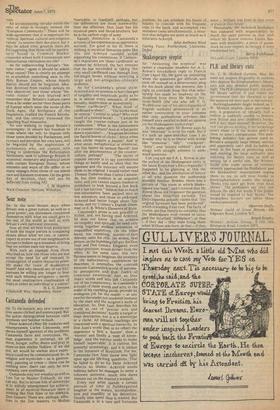Castaneda 'defended
Sir: To the eunuch, any new treatise on love seems cliched and stereotyped. But the sultan distinguished between valid synthesis and familiar re-hash.
Peter Ackroyd (May 10) traduces and misrepresents Carlos Castaneda. and shows himself ignorant of the problems Castaneda faces and overcomes. Human experience is universal; we all thirst, hunger, suffer, desire and pray in More-or-less similar fashion. If we did not, art would be useless since experience could not be communicated. So, in religion and mysticism — as in gastronomy, Painting or crime — there can be nothing new; there can only be new contexts, new syntheses. Castaneda may not weather as well as Lao Tse or Meister Eckhardt, no one can say. But to accuse him of stereotype IS to wilfully misrepresent his achievement. In all mystical literature there is nothing like Don Juan or his sidekick, Don Genaro. There are, perhaps, affinities to the Zen masters, to Mullah Nasruddin, to Gurdjieff, perhaps, but the differences are more noteworthy than the affinities. Don Juan has his mystical peers and blood-brothers, but he is the carbon-copy of none.
Equally distinctive is Castaneda's account of his experiences as apprentice sorcerer. For good or for ill, there is nothing in mystical literature quite like this, and Ackroyd carefully avoids supporting his contentions. It Castaneda's characters are 'sheer cardboard' as claimed by Ackroyd, the fact remains that he has succeeded in taking this very small cardboard cast through four full-length books without wearying a large and not-altogether-illiterate audience.
As for Castaneda's prose style. Ackroyd is in no position to hurl charges of turgidity and ineptitude; guilty as he is, in almost every sentence, of some banality, imprecision or monstrosity ... "Sheer cardboard". What kind of cardboard is sheer? ... "The books must be central." Central to what? Who ever heard of a central book? .....Castaneda caught the counter-culture just at its tumescence." What is the tumescence of a counter-culture? And at what point does it ejaculate? ... "his prose becomes the flaccid bearer of cliche." Since when does cliche require a bearer? And in what sense, metaphorical or otherwise, can this bearer be termed flaccid? Just after the detumescence of the counterculture, perhaps? . . . "The secret of popular success is to say conventional things so baldly and so often that the ignorant and the innocent will assume them to be original. I would rather read Thomas Traherne than Carlos Castaneda, but then tradtion is an acquired taste, and you cannot expect readers or publishers to took beyond a fast buck and a fast success." Seldom has so much non-information been packed into so few sentences, and those so awkward. Ackroyd had better forget about Traherne, and try Cobbett's English Grammar, or E. B. White's Elements of Style. Castaneda's prose is not graceful or stylish, and, not having read Ackroyd, he does not know that to achieve un-turgidity and eptitude, he need only string together endless sequences of unqualified expletives. On the other hand, his rambling, matter-of-fact delivery suits his role. He writes, first person, as the bumbling fall guy for Don Juan and Don Genaro. Elegance, even undue precision, would detract from the effect. At the same time, this very flatness seems to heighten the intensity of the hallucinatory experiences he describes; it intensifies the contrast between Castaneda's world of automatic perceptions and Don Juan's of conscious awareness. Just as Don Juan's words and acts jolt Castaneda out of his complacency, so Castaneda's account of these words and acts, in the midst of his rambling prose, provide an analagous jolt for the reader — at any rate for the reader not rendered immune by the stars and the surgeon's knife of education, So, Don Juan describes his world as one .of 'precise acts and considered decisions', hardly a turgid or inept description, nor it is a stereotype or a cliché. All initiatic teachings are concerned with a spiritual hierarchy. In Don Juan's world (but in no other) the apprentice is first a 'hunter', then a 'warrior' and finally a 'man of knowledge'. And the warrior seeks to make himself Impeccable'. It is curious, but powerful terminology, and it is unique in the literature of mysticism. For me, Castaneda/Don Juan threw new light upon age-old life-long questions. That he failed to do so for Peter Ackroyd reflects no blame: Ackroyd needs millenia before he manages to write a coherent sentence, much less dares venture out on the warrior's warpath.
Every real artist spends a certain amount of time in flabbergasted laughter at the malice, incomprehension and stupidity of his detractors. Usually time spent thus is wasted. But Castaneda is in a rare and fortunate position: he can schedule his bouts of hilarity to coincide with his frequent trips to the bank, and accomplish two mundane tasks simultaneously, a situation that delights me quite as much as it infuriates Ackroyd.
John Anthony West Garreg Fawr, Porthryhyd, Llanwrda, Dyfed


































 Previous page
Previous page